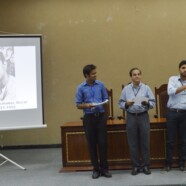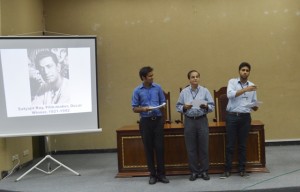Tagore remembered by History Dept and ELS
On 20 May 2013, the Department of History and Ewing Literary Society arranged a tribute to Rabindhranath Tagore, on the centenary of his wining the Nobel Prize in Literature in 1913, becoming the first non-European and first South Asian to achieve this honor Born in the illustrious ‘Thakur’ family (Anglicized to Tagore), Rabindranath’s father Dwarkanath was an important landlord, Zamindar, in Bengal who was a keen supporter of the social and religious reformer Raja Ram Mohan Roy. Rabi, as he was also known, was one of thirteen children, most of whom were pioneers in their field. One brother was a poet and philosopher, another was an accomplished musician, and a sister who was an accomplished novelist. Tagore was a true polymath and wrote matchless poetry, novels, plays, operas, philosophical tracts and even made fine paintings. His collection of poems, Gitangali, a collection 157 poems, made him world famous and was the main body of work which won him the Nobel Prize.
Tagore was a strong patriot though he was not a big supporter of nationalism. He staunchly supported the freedom struggle of Indians and even returned his knighthood in protest of the killings at Jallianwala Bagh in 1919. He wrote to Viceroy Lord Chelmsford: ‘The time has come when badges of honor make our shame glaring in the incongruous context of humiliation, and I for my part, wish to stand, shorn, of all special distinctions, by the side of those of my countrymen who, for their so called insignificance, are liable to suffer degradation not fit for human beings.’
Tagore was also not a supporter of the prevalent system of education. As a matter of fact he never finished a degree, and the only degrees he received were honorary ones from different universities, including one from Oxford, given exceptionally in India in 1940. In order to promote his ideas on education, Tagore set up an experimental school of learning, with a focus on what the students want to learn, at Shantiniketan, which later developed into the Visva Bharti University.
Tagore has inspired generations of people and Nobel Laureate Aung San Suu Kyi said in 2001, ‘During my years of house arrest I have learnt my most precious lesson from a poem by Rabindranath Tagore, many of whose verses reach out to that innermost, elusive land of the spirit that we are not always capable of exploring ourselves.’ Suu Kyi was inspired by Tagore’s poem, Ekla Chalo Re (go your own way alone). Similarly scores of people from all over the world have been mesmerized by his immortal words, both in poetry, song, novels and paintings.
The tribute was arranged by the students and faculty of FC College and began with a collage of Tagore’s paintings set to the tune of Ami Cheeni sung by Kishore Kumar. This was followed by a short biography of Tagore by Dr Yaqoob Khan Bangash, Chairperson of the Department of History. Then Tagore’s famous Elka Chalo Re sung by Shreya Ghoshal was set to a slideshow of quotes from Tagore and some of his iconic pictures with great figures like Albert Einstein, Helen Keller and Gandhi. The tribute also showed clips from a documentary by Oscar winner Satyajit Ray on Tagore focusing on his family, early life, experiments at Shantiniketan, and his political views.
The event then featured Ms Wania Khan and Mr Gadhaun Aslam reading poetry by Tagore on various themes. A short story by Tagore, The Parrot’s Training, was also read, which focused on the literal stuffing of a parrot with information by a king’s courtiers without regard to his life or health. In the end, the parrot dies due to an overload of information. This story in effect signified the educational philosophy and standards of the time, and unfortunately today, where rote learning, and collection of information without understanding and analysis are the focus of education.
The tribute ended with a reading of Amar Sonar Bangla, now the national anthem of Bangladesh, read in English by Dr Waseem Anwar, Dean of Humanities with Mr Mian Sarmad Hussain reading it in Bengali and Mr Faizan Akhtar rendering the same in Urdu. This recitation was accompanied by a background slideshow of pictures from the Bengali landscape and photographs of prominent Bengali leaders, thinkers, sportsmen, artists, and Nobel laureates from the last two hundred years. This was even more poignant as Pakistan had banned Tagore in East Pakistan in the 1960’s, and therefore this gesture was an attempt to show solidarity with the Bengali nation in recognition of the greatness of this great personality. Tagore, the program emphasized, is a South Asian laureate and must be remembered and celebrated by all of us.









